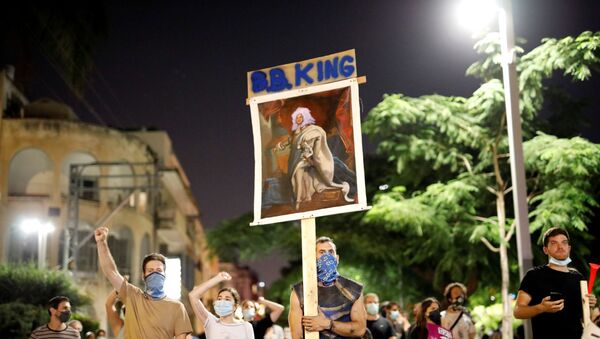Saturday night has once again gathered thousands of protesters outside Prime Minister Benjamin Netanyahu's official residence in Jerusalem.
Nothing has changed from the previous nights for the crowd: the slogan of 'crime minister' is still there, and people continue to voice their concerns about the dire economic situation Israel has been facing. But the calls demanding Netanyahu's resignation sound louder.
Israel has seen mass protests before. In 2011, thousands took to the streets of Tel Aviv and other cities across Israel demanding that the government implement a series of economic reforms that would lower the high costs of living.
Back then, the crowds were larger and at one point they gathered hundreds of thousands of people, all of whom were united around a common goal: to make the life in Israel more affordable for the masses.
Divided Yet United
This time around the protests are different. They are smaller in size. The biggest so far included some 15,000 people but the dissatisfaction of the masses is not uniformly directed towards the high costs of living. This time, their grievances differ.
Some are protesting against what they call the government's failure to tackle the acute economic crisis that has erupted as a result of COVID-19's outbreak, prompting thousands of Israelis to file for unemployment.
Others are frustrated with the lack of progress in the Israeli-Palestinian peace talks and carry slogans calling the government to end the "occupation" of the West Bank. There are those who have taken to the streets to fight "Netanyahu's corruption" and make sure that the PM who is accused of receiving illegal gifts and of buying positive media coverage for himself and his family, stands trial.
Netanyahu's Two Major Headaches
But although they are divided, Israeli media says Netanyahu has every reason to worry; the prime reason for this is the resilience of the protesters, who don't want to budge.
Once the strict restrictions imposed to curb the spread of the pandemic were lifted, crowds of people started gathering in cities across the country to force the government to implement a series of swift measures that would help Israelis overcome the economic crisis.
Initially, rallies were sporadic. They were relatively small, limited, and most importantly, restrained. But as time went by, and the government failed to introduce measures that would satisfy the masses, they grew bigger in size, more aggressive in attitude and have become an almost daily occurrence; and the problem is that they are not planning to go away any time soon.
Right-wing circles have troed to downplay their importance. One of Netanyahu's ministers called the protesters "a bunch of anarchists", whereas many of the prime minister's supporters say the 15,000 who took to the streets didn't represent the whole population, which was united behind Bibi.
Netanyahu too, tried to diminish the waves these protests were making. Initially he called them "an incubator for the spread of the pandemic", following an incident when a confirmed coronavirus patient attended one of those rallies.
Then, he said the protests were spreading anti-Netanyahu sentiment, showed a video of protesters inciting murder and warned his supporters that another assassination in Israel was just around the corner -- allegations refuted by many experts in Israel, who said the prime minister was well- protected.
להפגנות השמאל אין קווים אדומים: ביזוי סמלי מדינה, קריאות לרצח של ראש הממשלה ומשפחתו, וכאילו זה לא מספיק – גם מיצגים מיניים, וולגריים ומבישים, נגדי רעייתי. שפל המדרגה. אף אחד באופוזיציה לא גינה את הדברים הבזויים האלה - לא יאיר לפיד ולא איימן עודה! https://t.co/qdsKBeX5JW
— Benjamin Netanyahu (@netanyahu) August 5, 2020
כל גילויי ההסתה והשנאה הנוראה בהפגנות השמאל והקריאות לרצח - לא יעצרו אותי מלפעול למענכם ולמען המדינה שלנו.
— Benjamin Netanyahu (@netanyahu) July 31, 2020
אחרי תשעה באב אני מקווה שנוכל להפסיק את גילויי השנאה וההסתה הנוראיים האלה, ולחזור להתלכד כעם וכמדינה במאבק המשותף שלנו נגד הקורונה ולמען הצלת חייהם ופרנסתם של אזרחי ישראל. pic.twitter.com/htkyimSP0I
Finally he referred to the rallies as "left-wing" demonstrations aimed at toppling a legitimate leader and stipulated that they were funded by his haters and fueled by the country's mass media.
בנאום שנשא, תקף רה"מ @netanyahu את ההפגנות הנערכות נגדו בירושלים: "מאורגנות ע"י אירגוני השמאל, ממומנות ע"י קרנות השמאל". בנוסף, אמר: "הפגנות ספונטניות שמאורגנות במלונות פאר ומגדלי צמרת - הם גומרים לארגן את ההפגנה, הם הולכים לאכול ארוחה במלון 'וולדורף אסטוריה'" pic.twitter.com/6t3BQ79nx7
— ערוץ כנסת (@KnessetT) August 5, 2020
תיראו מופתעים https://t.co/Fg8zJe6llp
— Benjamin Netanyahu (@netanyahu) August 4, 2020
However, Netanyahu has been wrong in his estimations, and Israeli media reported on a number of cases where Likud supporters vented anger at Netanyahu during these protests, vowing not to vote for him again.
Recent polls echoed that trend. According to a Channel 13 survey released on Thursday, Netanyahu's Likud would get 29 out of 120 seats if elections were held today, a significant drop from the 36 seats it received in the last round of elections, held in early March.
Does it mean the protests succeeded in achieving one of its goals, namely, showing Netanyahu the door? Not necessarily. Israel's recent history remembers several instances in which the media has predicted the fall of Netanyahu but got disillusioned shortly thereafter.
In 2015, for example, the country's liberal circles were assured that in the parliamentary vote Bibi would be replaced by Itzhak Herzog, only to find out that the former had crushed him in the general polls. Several years later, amid the third round of the 2019 election campaign, those circles were disillusioned once again when the premier's Likud party received 36 votes, despite the PM' legal battles and the ongoing anti-Netanyahu coverage.
Will it happen this time too? Time will only reveal one thing with certainty: Netanyahu doesn't have the tendency to lay down arms without a fight.

